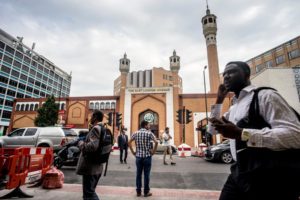Special to WorldTribune.com
 By Donald Kirk
By Donald Kirk
WASHINGTON ― We’ve been reading for so long about Britain’s economic troubles, the social system and the culture intertwined with the country’s slow, not always graceful, decline, that the British exit from the European Union comes as less than a shock.
Or if it is a shock, that’s because most of us only talked to people in and around London, maybe at Oxford or Cambridge or some other academic center, when not looking at stately cathedrals and cute country villages. Certainly, we didn’t talk a lot to the Brits who voted yes to Brexit — and more than likely the beginning of the end of an awkward attempt at uniting the disparate countries of Europe into a cohesive whole.

In a way you have to admire the desire of the Brits, that is, the ones we don’t generally talk to, to stand aside from the EU. What do all these non-elected Brussels bureaucrats mean, trying to tell us what to do, and why should we have to lose our beloved sterling currency, the way the French gave up the franc and the Germans the mark and the Italian the lire, in a sea of someone else’s money? Then there were all those Poles and Rumanians and everyone else trying to take our jobs when we could hardly find steady work ourselves while the toffs in “the City” were making off with billions from other people’s work.
Comparisons are always fallacious, but there are similarities here between the victory of the Brexit people and the populist support drummed up by Donald Trump from a lot of people we don’t talk to in the U.S. Not even most conservatives whom one sees here in Washington — the types who would be expected to favor any Republican candidate ― are happy about Trump. He speaks for the ones we hear only in quick bites on TV, people who worry about jobs taken by “illegal immigrants,” who don’t like cliques of highly educated and extremely rich people telling them what to do. Yes, in the populist mood, it’s easy for these people to forget that Trump ranks among the richest of them all.
Britain, if anything, is a more extreme case. It comes as a shock ― not the shock of Brexit but the prolonged shock of realization ― that the Brits have long since abandoned their position as a major industrial power. There aren’t any real British cars any more. The name brands we remember have been swallowed up by foreign companies. The same goes for electronic products. British firms aren’t competing with Samsung or LG or Apple or Intel for anything. They’re buyers and, perhaps, manufacturers of highly specialized products.
For a visitor to Britain who’s spent time in Korea and Japan, one visual shock is the railroad system. Hard to believe after routinely traveling on high-speed trains in Korea and Japan, but there is no such system binding the United Kingdom. You do see blathering in the papers about the ruination of the lovely English countryside if a high-speed rail road were to run, say, from London to Manchester and Liverpool. It’s going to be a long time before any system remotely equal to that in Korea or Japan links the cities of Britain, where railroads were introduced to the world in the early 19th century. As for ship-building, forget it. The famous shipyards that once produced the world’s mightiest steamships have long since surrendered to the competition from Korea, Japan and China.
Somehow to me the demise of Britain as an innovating, competitive, world-beating industrial power has something to do with Brexit. It’s not that British voters outside London are saying, we have to produce our own products, can’t let these Germans and French and others dump all their stuff on our markets. Rather, the greatest British industry today is finance, the wheeling and dealing in financial markets in the district of London known as “the City.” That’s where young people become millionaires, where the best minds dedicate themselves to becoming super-rich.
In an intensely class society, these elitists of “the City” look down on engineers and technicians and draftsmen as “tradesman,” and they have less respect for the welders and riveters and masons and drivers and all the others who dirty their hands making things work. Ok, the super-rich anywhere adopt attitudes of snobbery and superiority, but entrepreneurs in Korea and Japan built factories turning out products that are household names worldwide.
Britain’s decline has paralleled the rise of industry in Asia. The Americans too have lost out in ship-building and no longer make cameras or television sets, but the decline of American industry has not been so precipitous. If the vote on Brexit does not show the will to “make Britain great again,” it reveals the clash between those who work for a living and those who enrich themselves off other people’s “blood, toil, tears and sweat,” to quote Churchill’s maiden speech as prime minister in 1940 ― before urging his countrymen to stand fast in “their finest hour” against, yes, Germany, now the kingpin of the European Union.
Donald Kirk, in Washington at the moment, often visits London from his base in Seoul. He’s at kirkdon4343@gmail.com.
